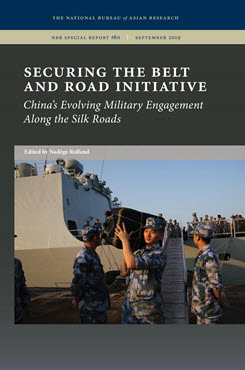China's Private Security Companies
The Evolution of a New Security Actor
This essay discusses the evolution of a new security actor—Chinese private security companies (PSCs)—and examines how PSCs guard Chinese interests abroad.
EXECUTIVE SUMMARY
MAIN ARGUMENT
China’s Belt and Road Initiative (BRI), which crosses many geographic borders, is expanding rapidly. As BRI spreads around the globe, the country must address a new set of problems and risks. Primary among these is the fact that China is now deepening its economic and personnel footprint in countries with serious political and security problems. An alternative pathway for the deployment of armed forces is the expansion of the Chinese private security industry. The purpose of this industry is to help Chinese state-owned enterprises protect themselves in dangerous places. Stimulated by BRI, the evolution of PSCs with “Chinese characteristics” will greatly affect China’s military-security plans and posture. From civil-military relations to the competition among ministries and government organizations to regulate the privatization of security, the future of Chinese PSCs is intertwined with the modernization of the People’s Liberation Army and the People’s Armed Police.
POLICY IMPLICATIONS
- The central government needs to work with regulators to adopt a comprehensive code of conduct to safeguard not only Chinese infrastructure and personnel but a broad range of stakeholders.
- China needs to promote sophisticated risk analysis and mitigation, especially when cooperating with third countries in infrastructure investments. Security incidents abroad involving Chinese PSCs have direct political consequences due to the blurred distinction between public and private in China.
- The international community needs to monitor the interaction between Chinese and international private military security companies from the U.S. and Russia and promote the transparency and accountability of Chinese PSCs.
- The Western powers need to closely monitor the impact of the Chinese private security sector on China’s military security doctrine and global force projection.
Alessandro Arduino is the Co-director of the Security and Crisis Management International Centre at the Shanghai Academy of Social Science and the External Affiliate in the Lau China Institute at King’s College London.



